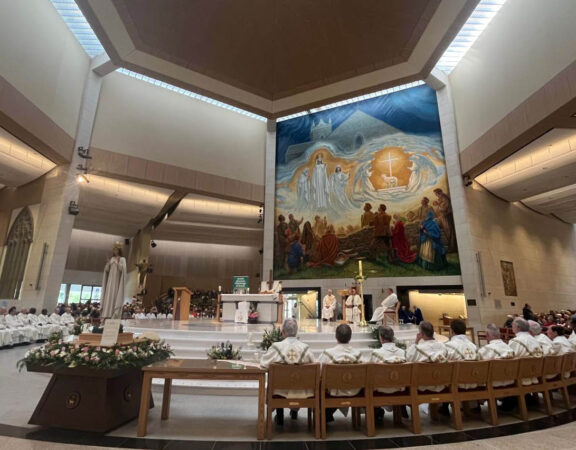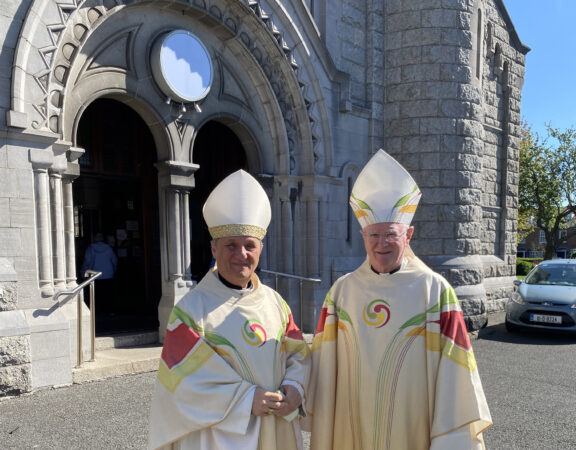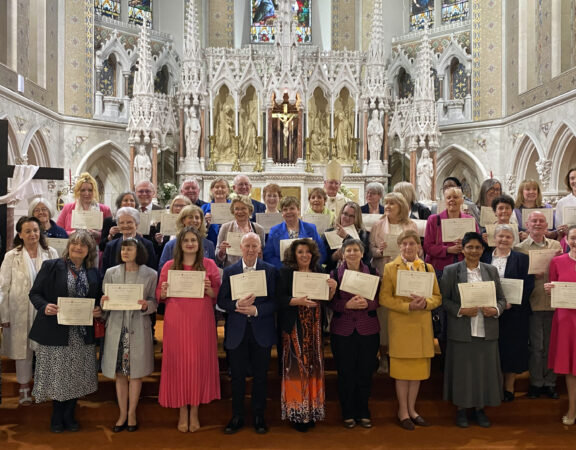LAUNCH OF THE BOOK:
THE IRISH SCHOOL OF ECUMENICS 1970-2007
THE IRISH SCHOOL OF ECUMENICS 1970-2007
Speaking Notes of
Most Rev. Diarmuid Martin
Archbishop of Dublin and Primate of Ireland
Most Rev. Diarmuid Martin
Archbishop of Dublin and Primate of Ireland
———-
Milltown Park, 3rd April 2008
Milltown Park, 3rd April 2008
The first thing that struck me in reading about the origins of the Irish School of Ecumenics was when it was founded. We are celebrating thirty years of its activities, from 1970 to 2007, as the book notes. Its roots go back further, as Michael Hurley notes in his Chapter on the First Decade, namely to a lecture series already to the 1960’s, beginning with a talk entitled Towards Christian Unity.
Times have changed since the 1960’s. The world has changed, the Church has changed and the way of looking at the path Towards Christian Unity has also changed.
In 1960 I was in secondary school and the spirit of Pope John had already begun to seep into Irish culture to the extent that our debating society had moved from asking whether Ireland should become the fifty-first State of the US to the theme of re-uniting Christians. Our understanding of Christian Unity was however rather narrow and in debate we had plenty of ammunition provided to us to defend the position that the Roman Catholic Church was the one true Church.
Pope John’s Council, which had not yet begun at that time, had already brought about change. The term ecumenical had moved into the language of the common man, although the Dublin common man often got Ecumenics confused with economics and even Dublin’s own version euchemenics.
In the 1970’s, when the Institute was formally opened, things had changed but not all had changed. I remember beginning my studies in Rome in 1970 opting for one the few courses on offer which had specific reference to the Second Vatican Council. It was a course given by a French Dominican Consultor to the Holy Office on the Ecclesiology of Vatican II, in which the most used term was Concilum Vaticanum Primum.
In Ireland change was coming slowly so that, to use the historic phrase of Archbishop McQuaid, the tranquillity of Christian consciences would not be disturbed. I asked recently what sort of a figure did Archbishop McQuaid cut in the Irish Episcopal Conference at the time and who were his opponents in debate. The answer showed me that I did not understand the spirit of those times. Archbishop McQuaid rarely spoke, I was told. When difficult or sensitive questions arose, Cardinal Dalton who was the President of the Conference simply said “I think the Archbishop is going to look after that”.
Archbishop McQuaid’s attitude to the new School of Ecumenics which was to open in his diocese in 1970 is described laconically in the book as having become “less negative and more sympathetic”. I am always interested in the development of dogma as witnessed in the minds of my predecessors, so I paid a rather rapid visit to my archives.
Always a stickler for linguistic correctness, Archbishop McQuaid had little time for the spelling Ecumenical; his preference was Oecumenical. He did devote some time to Father Michael Hurley. Michael Hurley had come to Archbishop McQuaid’s attention in the mid-sixties when he was invited to speak to the Dun Laoghaire Council of Churches. Monsignor Boylan, Parish Priest of Dun Laoghaire, was consulted and rather sarcastically responded that “lecturing to a Protestant gathering will do him [Hurley] no harm”. There was however a concern that it might give rose to the risk of “non-Catholic ‘periti’ bring invited to lecture to our Catholic people”.
Monsignor Boylan reappears some years later in the archive, concerned about Father Hurley’s doctrine of original sin as being close to that “advocated in the Dutch Catechism and rejected in His Grace’s Lenten Pastoral”
Archbishop McQuaid felt that he should impose an absolute prohibition on Father Hurley speaking within “my sphere of jurisdiction”. Father Hurley’s cause was, however, ably and passionately defended by Father Cecil McGarry, not yet Provincial, and Archbishop McQuaid in a letter to Father Barry the Provincial notes how due to his meeting with Father McGarry: “I yielded”.
Father Hurley however caused more anguish for Archbishop McQuaid when he, and I quote, “at a meeting of the Protestant Theological Society in the liberal university Trinity College, joined with three Protestant divines in a tribute to the ex-priest and ex-Catholic George Tyrell”. I found a fading copy of the text of the offending lecture, the work of a very early photocopier. I will have to consult the approved manuals of moral theology to see whether in the interests of history I should have a modern copy made or whether I should rather allow such an offending lecture to fade away into literal obscurity.
The question of “the”, or to quote more precisely “a” “School of Oecumenical Studies that you propose to set up at Sandford Road” comes up in correspondence with Father McGarry in May 1970. The Archbishop replies to Father McGarry, by now Provincial, in classic McQuaid style: “it is not clear to me whether you are merely informing me or asking my advice”. Father McGarry responds cleverly regarding this confusion noting: “I know that you will understand that the phrasing of my letter was such as not even to seem to commit Your Grace in any way with regard to the project”.
The archive provides little evidence of a move from the “less negative to more sympathetic”. The concluding paragraph of McQuaid’s letter reads: “How your proposed school will make a significant contribution towards preparing ‘one flock under one shepherd’, that is towards conversion to the one true Faith, is God’s secret”.
The archive provides little evidence of a move from the “less negative to more sympathetic”. The concluding paragraph of McQuaid’s letter reads: “How your proposed school will make a significant contribution towards preparing ‘one flock under one shepherd’, that is towards conversion to the one true Faith, is God’s secret”.
I cannot help thinking that Father McGarry has missed a great title for his book on the Irish School of Ecumenics: “God’s secret.”
Archbishop McQuaid concludes in another letter: “The school is, of course, Father Hurley” and “will provide very few converts”
By December of 1970 Archbishop McQuaid had once again yielded, this time to the spelling “Ecumenical”. “The Ecumenical Institute”, he wrote, “was planned in detail and publicly launched without the slightest reference to me.” Some days before publication “the Provincial notified me of the constitution of the Institute and asked my blessing on it”. There is no indication of whether that blessing was ever given or withheld. The final recorded word in the Archive is however that the way he was informed about the Ecumenical Institute “was at least some improvement on the Institute of Theology and Philosophy – about which I first learned in the newspaper”.
That was one side of the world in which the Irish School of Ecumenics emerged. On the other hand, the late 60’s and early 70’s were extremely important years in ecumenical relations, following on the impulses given by Pope John. It was time of looking forward with hope. I sometimes look on that time like the Gorbachev era in the Soviet Union, when the changes that were taking place were the changes that enlightened people wanted and considered so good that it appeared unreasonable to think that there might also be the less enlightened out there who would not be able to go the same path.
The early 70’s were also the beginning of the troubles in Northern Ireland which in their own way became the beginnings, the “felix culpa”, of the process of coming together and healing of the barriers which had long kept estranged communities apart. The leaders of the Irish School of Ecumenics had the genial intuition of recognising early that Ecumenics and peace building belonged together. On the one hand, building peace and reconciliation have to involve bringing together divided religious communities, while on the other hand, one realised that the Churches, however divided, can be an extraordinary force for peace, becoming more effective peace builders the more they began to overcome their divisions.
In that sense the dilemma, mentioned in the book at various points, between secular peace studies and theologically-based peace studies, is fundamentally a false dilemma. It is a false dilemma because it either considers, from a secular point of view, that theology is irrelevant to peace promotion or, from a more purist theological point of view, that building peace to be theologically irrelevant.
Over a number of decades then these two aspects of the work of the Irish School of Ecumenics – ecumenical studies and peace studies – have led to the School to be recognised as not just one of the more stimulating centres on the theological landscape, but also a model for the way in which the validity of theology, as theology, should be recognised as a valid contribution to the building of a pluralist society and its values.
From the school’s experience, we can draw lessons and challenges regarding teaching theology in today’s pluralist Ireland and the place of theology within the overall framework of the formation of Irish culture in the future. The experience of the School shows that both a prejudicial exclusion of theology from the University or a flight of theology into the safer corridors of the seminary are both missing the point and render society and academic research all the poorer. I find that there are very interesting reflections on this relationship in Pope Benedict’s talk that was never given, that which he had prepared for the University La Sapienza in Rome and which I recommend to your reading.
He notes that “the danger for the western world… is that today, precisely because of the greatness of our knowledge and power; we will fail to face up to the question of the truth. This would mean at the same time that reason would ultimately bow to the pressure of interests and the attraction of utility, constrained to recognize this as the ultimate criterion. To put it from the point of view of the structure of the university: there is a danger that philosophy, no longer considering itself capable of its true task, will degenerate into positivism; and that theology, with its message addressed to reason, will be limited to the private sphere of a more or less numerous group.
There is a particular challenge in Ireland if theology is to survive as an academic discipline and standards are to be kept high, namely the need for a major rationalisation of the teaching centres of theological studies within the country. Fortunately today there are ways of “virtual rationalisation” through which faculties and teachers and libraries can be interlinked in such a way that relatively small institution can survive without losing their identity through creating a level of scale which makes them in the long term more sustainable.
Where is Ecumenics going for the future? Obviously in Ireland there is a strong feeling that the path followed from strict confessionalism, to ecumenical interaction between the Christian Churches must now move forward to a new opening towards a dialogue with other faiths. The Irish School of Ecumenics had already begun with this process even before the current religious pluralism in Ireland had made that a more pressing necessity.
I was happy this year to be able to bring to a conclusion the process through which the Roman Catholic Church in Dublin became a full member of the Dublin Council of Churches and my hope is that Council can be renewed and can become more anchored within the realities of the society of greater Dublin.
I believe that today in Dublin we also need an Dublin Inter-Faith Forum which could act as an agile platform in which the different faiths present in our society could come together to deepen their bonds of fellowship, to address common issues and witness in a more secular environment to the reality of belief.
This does not mean that the very specific responsibility of all Christians to address the call of Jesus towards unity can be left aside. We must still learn what in practice our common baptism means for relations between our Churches. We need to foster new forms of ecumenical collaboration. Today we have the additional enrichment of the presence among us of various Orthodox Communities.
We need more reflection on how spiritual ecumenism can widen the ecumenical forum from that of just the experts to the broad range of the communities and experiences which characterise the life of our Churches. The pioneers of ecumenism have often been charismatic figures whose personal reflection on the Gospels and the sensitivity which emerges from their prayer life have been able to establish relations across all the frontiers of Christian confessions which then deepen our common understanding the mystery of the Church. I think for example to the extraordinary influence of someone like Chiara Lubich who died recently.
The Irish School of Ecumenics has witnessed to the important bond between faith and the real life of a troubled Ireland in the past thirty years. I hope that it will continue to bring its charism to the new challenges which Ireland, North and South, must face for the years to come. I congratulate Michael Hurley and all those who have followed in his footsteps.
Speaking Notes ofArchbishop of Dublin and Primate of Ireland
Speaking Notes ofArchbishop of Dublin and Primate of Ireland
Speaking Notes ofArchbishop of Dublin and Primate of Ireland









